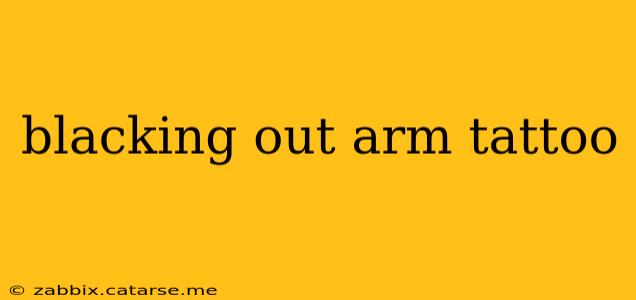Getting a tattoo is a significant decision, a form of self-expression that can last a lifetime. But what happens when you decide that a tattoo, once cherished, no longer resonates with you? Blacking out an arm tattoo is one option to cover up unwanted ink, transforming a potentially regrettable design into a bold, new statement. This guide explores the process, considerations, and frequently asked questions surrounding blacking out arm tattoos.
What Does Blacking Out a Tattoo Mean?
Blacking out a tattoo involves covering the existing artwork with a solid layer of black ink. This technique completely obscures the original design, creating a dramatic, unified look. It's a popular method for covering up tattoos that are faded, poorly executed, or simply no longer desired. Unlike other cover-up methods that may involve intricate designs, blacking out is a straightforward approach.
Why Choose to Black Out a Tattoo Instead of Other Cover-Up Methods?
Several reasons make blacking out an attractive option for covering up unwanted tattoos:
- Simplicity: It's a straightforward process, requiring less artistic skill from the tattoo artist compared to more complex cover-ups.
- Effectiveness: Black ink effectively hides most existing designs, regardless of color or complexity.
- Bold Statement: The resulting solid black canvas can be a powerful aesthetic choice in itself.
- Cost-Effectiveness (potentially): Depending on the size and complexity of the original tattoo, blacking out can sometimes be a more affordable option than intricate cover-ups.
How Much Does Blacking Out an Arm Tattoo Cost?
The cost of blacking out a tattoo varies significantly depending on several factors:
- Size of the tattoo: Larger tattoos naturally require more time and ink, increasing the cost.
- Location of the tattoo: Some areas of the arm (e.g., the inner elbow) might be more challenging to tattoo, impacting the price.
- Tattoo artist's experience and reputation: Experienced artists with strong reputations often charge higher rates.
- Studio location: Prices can vary geographically.
It's essential to consult with multiple tattoo artists for accurate quotes before committing to the procedure.
Does Blacking Out a Tattoo Hurt?
The pain level associated with blacking out a tattoo is similar to getting a new tattoo of the same size and location. Areas with thinner skin (like the inner forearm) tend to be more sensitive than those with thicker skin (like the outer bicep). Pain tolerance is also highly individual. However, many people find that the process is less painful than the original tattoo, as the skin has already been through the healing process once.
How Long Does It Take to Black Out an Arm Tattoo?
The time required to black out a tattoo depends on its size and the artist's speed. Smaller tattoos may take a few hours, while larger ones could take multiple sessions spanning several days or weeks, allowing for proper healing between sessions.
How Long Does It Take to Heal After Blacking Out a Tattoo?
The healing time for a blacked-out tattoo is similar to that of any other tattoo. Expect the area to be tender, slightly swollen, and possibly itchy for a few days. The healing process typically takes 2-4 weeks, but complete healing can take several months. Following proper aftercare instructions from your tattoo artist is crucial for optimal healing and minimizing the risk of infection or complications.
Can I Black Out My Tattoo in Multiple Sessions?
Yes, it's commonly recommended to black out large tattoos in multiple sessions. This allows for proper healing between appointments and minimizes stress on the skin. Your tattoo artist will assess your tattoo and recommend a suitable session plan.
What Are the Risks of Blacking Out a Tattoo?
While generally safe, blacking out a tattoo carries the same risks as any tattooing procedure:
- Infection: Proper hygiene and aftercare are essential to prevent infection.
- Allergic reactions: Some individuals may be allergic to certain tattoo inks.
- Scarring: In rare cases, improper technique or poor aftercare can lead to scarring.
- Unsatisfactory results: Choosing an inexperienced artist can result in an unsatisfactory outcome.
Always choose a reputable, licensed tattoo artist with a strong portfolio and experience with black-out tattoos.
Choosing the Right Tattoo Artist for Blacking Out
Finding an experienced and reputable artist is crucial for achieving the desired results and minimizing risks. Look for artists who specialize in cover-ups and blackwork. Examine their portfolios to assess their skills and style. Thoroughly research and read reviews before making your decision. Remember that choosing the right artist is just as important as the decision to black out your tattoo. A consultation before the procedure is highly recommended. Discuss your expectations and concerns with the artist to ensure you are both on the same page.
This guide provides a comprehensive overview of blacking out arm tattoos. Remember that individual experiences may vary. Always consult with a professional tattoo artist to discuss your specific needs and concerns before proceeding.
